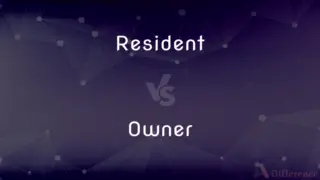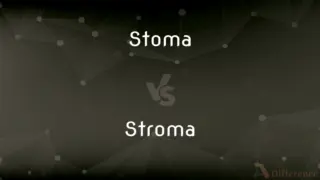Disinfectant vs. Detergent — What's the Difference?
Edited by Tayyaba Rehman — By Maham Liaqat — Updated on May 10, 2024
Disinfectants kill bacteria and viruses on surfaces, focusing on sterilization; detergents clean by removing dirt and stains, primarily for hygiene.

Difference Between Disinfectant and Detergent
Table of Contents
ADVERTISEMENT
Key Differences
Disinfectants are chemicals used to destroy harmful microorganisms on surfaces, making them essential in healthcare settings. Detergents, on the other hand, are designed to clean surfaces and fabrics by removing dirt, grime, and stains through chemical action.
Disinfectants often contain substances like alcohol or bleach that are effective in killing bacteria and viruses. Whereas detergents use surfactants and enzymes to break down and remove soil and organic material, making them less effective in sterilizing surfaces.
The primary function of disinfectants is to reduce the risk of infection by eliminating pathogens. Detergents, on the other hand, are more concerned with improving appearance and removing odors rather than killing germs.
While disinfectants are crucial for infection control in environments like hospitals and clinics, detergents are commonly used in homes and businesses for general cleaning tasks.
Disinfectants require a certain contact time on surfaces to effectively kill germs, which can vary from product to product. Detergents, however, typically work immediately upon application and are rinsed away, primarily focusing on cleaning effectiveness.
ADVERTISEMENT
Comparison Chart
Primary Purpose
Remove bacteria and viruses
Clean and remove dirt
Key Ingredients
Alcohol, bleach, hydrogen peroxide
Surfactants, enzymes
Usage Area
Hospitals, homes (for sterilization)
General household and laundry
Effect on Microorganisms
Destroys or deactivates pathogens
Does not typically kill germs
Typical Application
Requires contact time for effectiveness
Works immediately, rinsed off
Compare with Definitions
Disinfectant
A disinfectant is a chemical substance or compound used to inactivate or destroy microorganisms on inert surfaces. Disinfection does not necessarily kill all microorganisms, especially resistant bacterial spores; it is less effective than sterilization, which is an extreme physical or chemical process that kills all types of life.
Detergent
A detergent is a surfactant or a mixture of surfactants with cleansing properties in dilute solutions. These substances are usually alkylbenzene sulfonates, a family of compounds that are similar to soap but are more soluble in hard water, because the polar sulfonate (of detergents) is less likely than the polar carboxylate (of soap) to bind to calcium and other ions found in hard water.
Disinfectant
A chemical liquid that destroys bacteria
All surfaces are cleaned manually or by pressure washer with disinfectant
A cat won't use its litter box if it's cleaned with smelly disinfectants
Detergent
A water-soluble cleansing agent which combines with impurities and dirt to make them more soluble, and differs from soap in not forming a scum with the salts in hard water
Packets of detergent
Liquid detergents
Disinfectant
Causing disinfection
Cleansing and disinfectant products
Detergent
Relating to detergents or their action
Staining that resists detergent action
Disinfectant
An agent, such as heat, radiation, or a chemical, that is applied to inanimate objects to destroy, neutralize, or inhibit the growth of disease-carrying microorganisms.
Detergent
A cleansing substance that acts similarly to soap but is made from chemical compounds rather than fats and lye.
Disinfectant
Serving to disinfect.
Detergent
Having cleansing power.
Disinfectant
Serving to kill germs or viruses.
I washed repeatedly with a disinfectant soap but I still caught the flu.
Detergent
Any non-soap cleaning agent, especially a synthetic surfactant.
Disinfectant
A substance that kills germs and/or viruses.
The scalpels were soaked in disinfectant before the operation so disease wouldn't be spread.
Detergent
Syn of cleansing.
Disinfectant
That which disinfects, especially an agent for killing or removing the microorganisms which cause infection. Commonly used disinfectants are chlorine, sodium hypochlorite solution, hydrogen peroxide, and alcohol.
Detergent
Cleansing; purging.
Disinfectant
An agent (as heat or radiation or a chemical) that destroys microorganisms that might carry disease
Detergent
A surface-active chemical widely used in industry and laundering
Disinfectant
Preventing infection by inhibiting the growth or action of microorganisms
Detergent
A cleansing agent that differs from soap but can also emulsify oils and hold dirt in suspension
Detergent
Having cleansing power
Share Your Discovery

Previous Comparison
Resident vs. Owner
Next Comparison
Stoma vs. StromaAuthor Spotlight
Written by
Maham LiaqatEdited by
Tayyaba RehmanTayyaba Rehman is a distinguished writer, currently serving as a primary contributor to askdifference.com. As a researcher in semantics and etymology, Tayyaba's passion for the complexity of languages and their distinctions has found a perfect home on the platform. Tayyaba delves into the intricacies of language, distinguishing between commonly confused words and phrases, thereby providing clarity for readers worldwide.














































